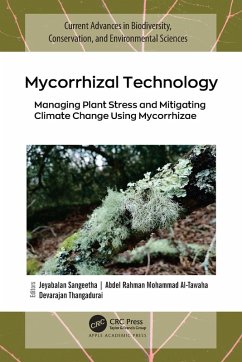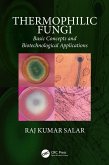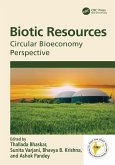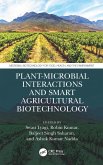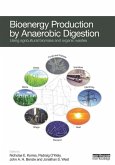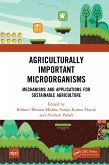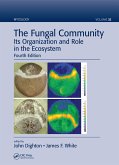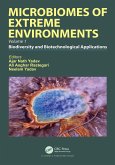Mycorrhizal Technology (eBook, ePUB)
Managing Plant Stress and Mitigating Climate Change Using Mycorrhizae
Redaktion: Sangeetha, Jeyabalan; Thangadurai, Devarajan; Mohammad Al-Tawaha, Abdel Rahman
129,95 €
129,95 €
inkl. MwSt.
Sofort per Download lieferbar

65 °P sammeln
129,95 €
Als Download kaufen

129,95 €
inkl. MwSt.
Sofort per Download lieferbar

65 °P sammeln
Jetzt verschenken
Alle Infos zum eBook verschenken
129,95 €
inkl. MwSt.
Sofort per Download lieferbar
Alle Infos zum eBook verschenken

65 °P sammeln
Mycorrhizal Technology (eBook, ePUB)
Managing Plant Stress and Mitigating Climate Change Using Mycorrhizae
Redaktion: Sangeetha, Jeyabalan; Thangadurai, Devarajan; Mohammad Al-Tawaha, Abdel Rahman
- Format: ePub
- Merkliste
- Auf die Merkliste
- Bewerten Bewerten
- Teilen
- Produkt teilen
- Produkterinnerung
- Produkterinnerung

Bitte loggen Sie sich zunächst in Ihr Kundenkonto ein oder registrieren Sie sich bei
bücher.de, um das eBook-Abo tolino select nutzen zu können.
Hier können Sie sich einloggen
Hier können Sie sich einloggen
Sie sind bereits eingeloggt. Klicken Sie auf 2. tolino select Abo, um fortzufahren.

Bitte loggen Sie sich zunächst in Ihr Kundenkonto ein oder registrieren Sie sich bei bücher.de, um das eBook-Abo tolino select nutzen zu können.
Examines the studies on mycorrhizal technology that show the positive impact of root symbiosis on plant adaptation to climate-associated abiotic stressors, such as salinity, drought, flooding, and high temperatures.
- Geräte: eReader
- ohne Kopierschutz
- eBook Hilfe
- Größe: 14.18MB
Andere Kunden interessierten sich auch für
![Thermophilic Fungi (eBook, ePUB) Thermophilic Fungi (eBook, ePUB)]() Raj Kumar SalarThermophilic Fungi (eBook, ePUB)50,95 €
Raj Kumar SalarThermophilic Fungi (eBook, ePUB)50,95 €![Biotic Resources (eBook, ePUB) Biotic Resources (eBook, ePUB)]() Biotic Resources (eBook, ePUB)51,95 €
Biotic Resources (eBook, ePUB)51,95 €![Plant-Microbial Interactions and Smart Agricultural Biotechnology (eBook, ePUB) Plant-Microbial Interactions and Smart Agricultural Biotechnology (eBook, ePUB)]() Plant-Microbial Interactions and Smart Agricultural Biotechnology (eBook, ePUB)47,95 €
Plant-Microbial Interactions and Smart Agricultural Biotechnology (eBook, ePUB)47,95 €![Bioenergy Production by Anaerobic Digestion (eBook, ePUB) Bioenergy Production by Anaerobic Digestion (eBook, ePUB)]() Bioenergy Production by Anaerobic Digestion (eBook, ePUB)46,95 €
Bioenergy Production by Anaerobic Digestion (eBook, ePUB)46,95 €![Agriculturally Important Microorganisms (eBook, ePUB) Agriculturally Important Microorganisms (eBook, ePUB)]() Agriculturally Important Microorganisms (eBook, ePUB)53,95 €
Agriculturally Important Microorganisms (eBook, ePUB)53,95 €![The Fungal Community (eBook, ePUB) The Fungal Community (eBook, ePUB)]() The Fungal Community (eBook, ePUB)48,95 €
The Fungal Community (eBook, ePUB)48,95 €![Microbiomes of Extreme Environments (eBook, ePUB) Microbiomes of Extreme Environments (eBook, ePUB)]() Microbiomes of Extreme Environments (eBook, ePUB)72,95 €
Microbiomes of Extreme Environments (eBook, ePUB)72,95 €-
-
-
Examines the studies on mycorrhizal technology that show the positive impact of root symbiosis on plant adaptation to climate-associated abiotic stressors, such as salinity, drought, flooding, and high temperatures.
Dieser Download kann aus rechtlichen Gründen nur mit Rechnungsadresse in A, B, BG, CY, CZ, D, DK, EW, E, FIN, F, GR, HR, H, IRL, I, LT, L, LR, M, NL, PL, P, R, S, SLO, SK ausgeliefert werden.
Produktdetails
- Produktdetails
- Verlag: Taylor & Francis eBooks
- Seitenzahl: 304
- Erscheinungstermin: 9. Januar 2024
- Englisch
- ISBN-13: 9781000927962
- Artikelnr.: 69570219
- Verlag: Taylor & Francis eBooks
- Seitenzahl: 304
- Erscheinungstermin: 9. Januar 2024
- Englisch
- ISBN-13: 9781000927962
- Artikelnr.: 69570219
- Herstellerkennzeichnung Die Herstellerinformationen sind derzeit nicht verfügbar.
Jeyabalan Sangeetha, PhD, is Assistant Professor in the Department of Environmental Science at Central University of Kerala, Kasaragod, South India. She has edited/coedited several books in her research areas, which include environmental toxicology, environmental microbiology, environmental biotechnology, and environmental nanotechnology. She earned her BSc in Microbiology and PhD in Environmental Science from Bharathidasan University, Tiruchirappalli, Tamil Nadu, India. She holds an MSc in Environmental Science from Bharathiar University, Coimbatore, Tamil Nadu, India. She is the recipient of a Tamil Nadu Government Scholarship and a Rajiv Gandhi National Fellowship of the University Grants Commission, Government of India, for her doctoral studies. She served as Dr. D.S. Kothari Postdoctoral Fellow and UGC Postdoctoral Fellow at Karnatak University, Dharwad, South India, during 2012-2016 with funding from the University Grants Commission, Government of India, New Delhi. Abdel Rahman Mohammad Al-Tawaha, PhD, is a full Professor of Plant Science, former Head of the Department of Biological Sciences, and former Director of Planning, Information and Quality Unit at Al Hussein Bin Talal University, Jordan. He earned his PhD at McGill University, Montreal, Canada, in 2006. He is the author/coauthor of more than 200 publications in plant science in leading peer-reviewed journals and chapters in edited volumes and books on a broad range of development issues. He is the Founder and Editor-in-Chief of Advances in Environmental Biology. He is also participated in many international conferences as chair or member of the scientific committees. Devarajan Thangadurai, PhD, is Associate Professor at Karnatak University in South India. He has authored/edited over 30 books with national and international publishers and has visited 24 countries in Asia, Europe, Africa, and the Middle East for academic visits, scientific meetings, and international collaborations. He received his PhD in Botany from Sri Krishnadevaraya University in South India as a CSIR Senior Research Fellow with funding from the Ministry of Science and Technology, Government of India. He served as a Postdoctoral Fellow at the University of Madeira, Portugal; University of Delhi, India; and ICAR National Research Centre for Banana, India. He is the recipient of a Best Young Scientist Award with a Gold Medal from Acharya Nagarjuna University, India, and the VGST-SMYSR Young Scientist Award of the Government of Karnataka, Republic of India.
PART I: MYCORRHIZAL PRODUCTION FOR PLANT GROWTH, PHOSPHORUS METABOLISM, AND
BIOLOGICAL CONTROL 1. Types, Importance, and Factors Affecting Mycorrhiza
Production for Sustainable Plant Growth 2. Mycorrhizal Role in Phosphorus
Metabolism 3. Mycorrhiza as a Biocontrol Agent PART II: MYCORRHIZAE IN
AGRICULTURAL, HORTICULTURAL, AND BIOTECHNOLOGICAL SECTORS 4. Application of
Arbuscular Mycorrhiza Fungi in Agricultural and Horticultural Crops 5.
Arbuscular Mycorrhiza in Citrus 6. Arbuscular Mycorrhizal Biotechnology and
Its Applications PART III: MYCORRHIZAL FUNGI FOR MANAGING BIOTIC AND
ABIOTIC STRESSES IN CROP PLANTS 7. Arbuscular Mycorrhiza under Biotic and
Abiotic Stress 8. Role of Mycorrhizal Fungi in Plant Growth: Implications
in Abiotic Stress Tolerance 9. Arbuscular Mycorrhizal Fungi in Salinity
Tolerance and Growth Response in Plants under Salt Stress Conditions 10.
Arbuscular Mycorrhizal Fungi in Alleviation of Cold Stress in Plants PART
IV: MYCORRHIZAL FUNGI FOR SUSTAINABLE AGRICULTURAL DEVELOPMENT, MITIGATING
CLIMATE CHANGE, ENSURING FOOD SECURITY, AND GLOBAL ENVIRONMENTAL
SUSTAINABILITY 11. Role of AMF in Sustainable Agriculture 12. Mitigating
Climate Change and Ensuring Food Security through Application of Mycorrhiza
in the Climate-Smart Farming System 13. Impact of Arbuscular Mycorrhizal
Fungi in Global Sustainable Environment
BIOLOGICAL CONTROL 1. Types, Importance, and Factors Affecting Mycorrhiza
Production for Sustainable Plant Growth 2. Mycorrhizal Role in Phosphorus
Metabolism 3. Mycorrhiza as a Biocontrol Agent PART II: MYCORRHIZAE IN
AGRICULTURAL, HORTICULTURAL, AND BIOTECHNOLOGICAL SECTORS 4. Application of
Arbuscular Mycorrhiza Fungi in Agricultural and Horticultural Crops 5.
Arbuscular Mycorrhiza in Citrus 6. Arbuscular Mycorrhizal Biotechnology and
Its Applications PART III: MYCORRHIZAL FUNGI FOR MANAGING BIOTIC AND
ABIOTIC STRESSES IN CROP PLANTS 7. Arbuscular Mycorrhiza under Biotic and
Abiotic Stress 8. Role of Mycorrhizal Fungi in Plant Growth: Implications
in Abiotic Stress Tolerance 9. Arbuscular Mycorrhizal Fungi in Salinity
Tolerance and Growth Response in Plants under Salt Stress Conditions 10.
Arbuscular Mycorrhizal Fungi in Alleviation of Cold Stress in Plants PART
IV: MYCORRHIZAL FUNGI FOR SUSTAINABLE AGRICULTURAL DEVELOPMENT, MITIGATING
CLIMATE CHANGE, ENSURING FOOD SECURITY, AND GLOBAL ENVIRONMENTAL
SUSTAINABILITY 11. Role of AMF in Sustainable Agriculture 12. Mitigating
Climate Change and Ensuring Food Security through Application of Mycorrhiza
in the Climate-Smart Farming System 13. Impact of Arbuscular Mycorrhizal
Fungi in Global Sustainable Environment
PART I: MYCORRHIZAL PRODUCTION FOR PLANT GROWTH, PHOSPHORUS METABOLISM, AND
BIOLOGICAL CONTROL 1. Types, Importance, and Factors Affecting Mycorrhiza
Production for Sustainable Plant Growth 2. Mycorrhizal Role in Phosphorus
Metabolism 3. Mycorrhiza as a Biocontrol Agent PART II: MYCORRHIZAE IN
AGRICULTURAL, HORTICULTURAL, AND BIOTECHNOLOGICAL SECTORS 4. Application of
Arbuscular Mycorrhiza Fungi in Agricultural and Horticultural Crops 5.
Arbuscular Mycorrhiza in Citrus 6. Arbuscular Mycorrhizal Biotechnology and
Its Applications PART III: MYCORRHIZAL FUNGI FOR MANAGING BIOTIC AND
ABIOTIC STRESSES IN CROP PLANTS 7. Arbuscular Mycorrhiza under Biotic and
Abiotic Stress 8. Role of Mycorrhizal Fungi in Plant Growth: Implications
in Abiotic Stress Tolerance 9. Arbuscular Mycorrhizal Fungi in Salinity
Tolerance and Growth Response in Plants under Salt Stress Conditions 10.
Arbuscular Mycorrhizal Fungi in Alleviation of Cold Stress in Plants PART
IV: MYCORRHIZAL FUNGI FOR SUSTAINABLE AGRICULTURAL DEVELOPMENT, MITIGATING
CLIMATE CHANGE, ENSURING FOOD SECURITY, AND GLOBAL ENVIRONMENTAL
SUSTAINABILITY 11. Role of AMF in Sustainable Agriculture 12. Mitigating
Climate Change and Ensuring Food Security through Application of Mycorrhiza
in the Climate-Smart Farming System 13. Impact of Arbuscular Mycorrhizal
Fungi in Global Sustainable Environment
BIOLOGICAL CONTROL 1. Types, Importance, and Factors Affecting Mycorrhiza
Production for Sustainable Plant Growth 2. Mycorrhizal Role in Phosphorus
Metabolism 3. Mycorrhiza as a Biocontrol Agent PART II: MYCORRHIZAE IN
AGRICULTURAL, HORTICULTURAL, AND BIOTECHNOLOGICAL SECTORS 4. Application of
Arbuscular Mycorrhiza Fungi in Agricultural and Horticultural Crops 5.
Arbuscular Mycorrhiza in Citrus 6. Arbuscular Mycorrhizal Biotechnology and
Its Applications PART III: MYCORRHIZAL FUNGI FOR MANAGING BIOTIC AND
ABIOTIC STRESSES IN CROP PLANTS 7. Arbuscular Mycorrhiza under Biotic and
Abiotic Stress 8. Role of Mycorrhizal Fungi in Plant Growth: Implications
in Abiotic Stress Tolerance 9. Arbuscular Mycorrhizal Fungi in Salinity
Tolerance and Growth Response in Plants under Salt Stress Conditions 10.
Arbuscular Mycorrhizal Fungi in Alleviation of Cold Stress in Plants PART
IV: MYCORRHIZAL FUNGI FOR SUSTAINABLE AGRICULTURAL DEVELOPMENT, MITIGATING
CLIMATE CHANGE, ENSURING FOOD SECURITY, AND GLOBAL ENVIRONMENTAL
SUSTAINABILITY 11. Role of AMF in Sustainable Agriculture 12. Mitigating
Climate Change and Ensuring Food Security through Application of Mycorrhiza
in the Climate-Smart Farming System 13. Impact of Arbuscular Mycorrhizal
Fungi in Global Sustainable Environment
